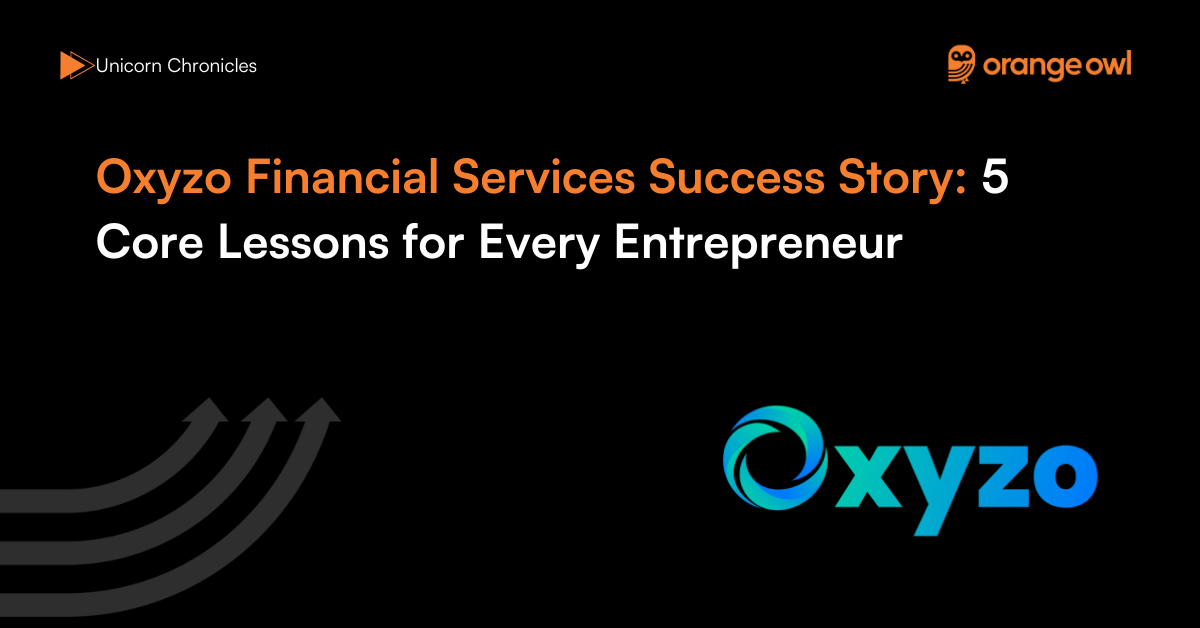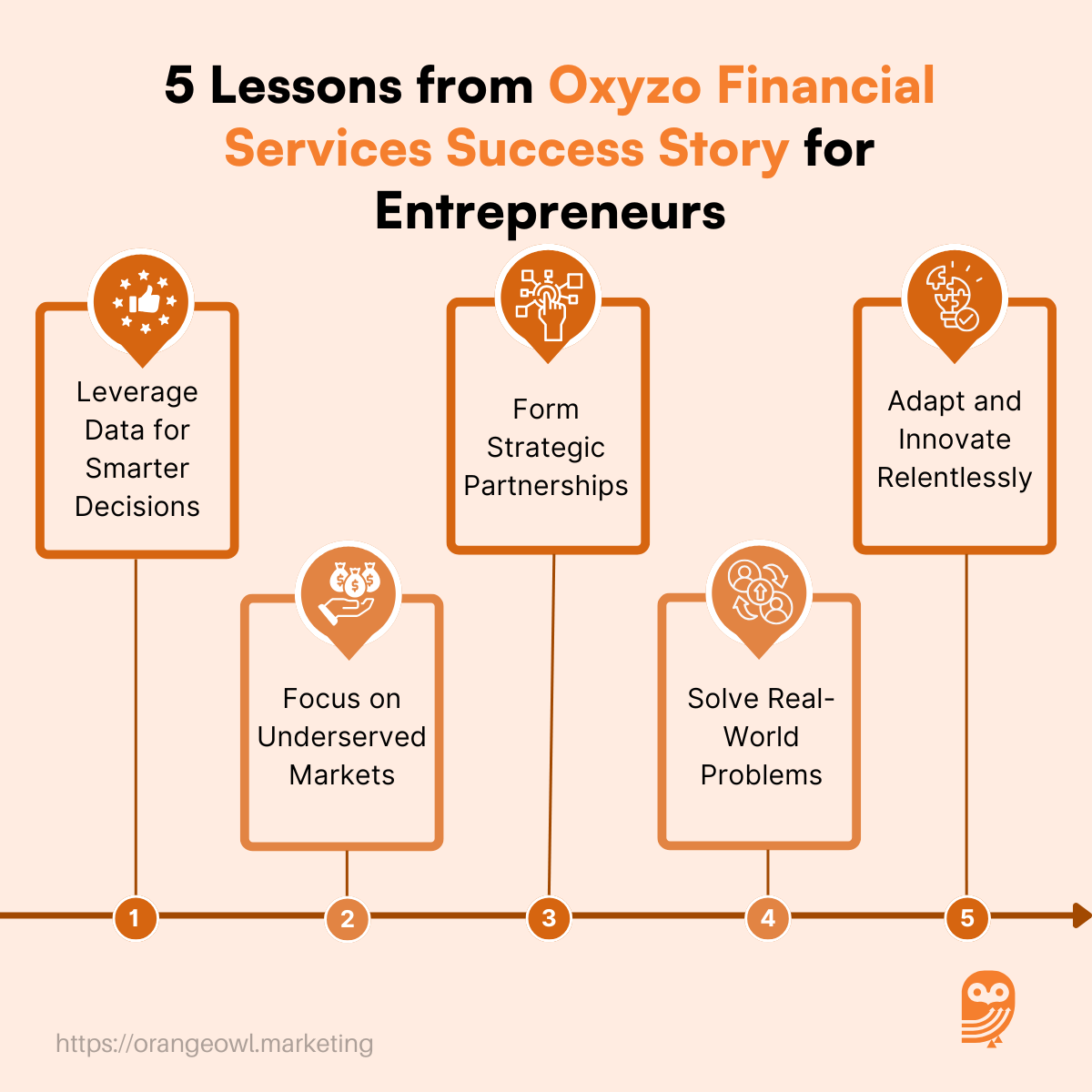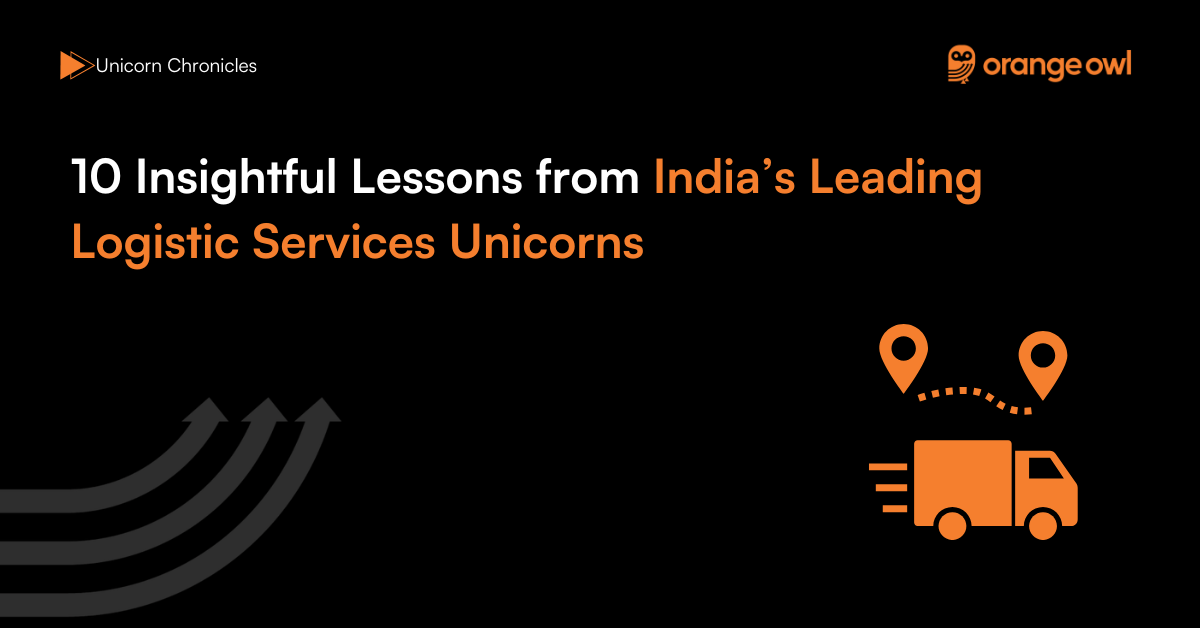Oxyzo Financial Services Success Story: 5 Core Lessons for Every Entrepreneur
Vivek Goel
May 8, 2025

Table of Contents
Introduction
In India’s fast-growing but credit-starved SME sector, timely and tailored financing remains a pressing challenge. Traditional lenders are often too slow, too cautious, or too rigid in their processes — leaving millions of small businesses underserved. This is where Oxyzo Financial Services stepped in to disrupt the status quo.
Launched in 2016 as the lending arm of B2B commerce platform OfBusiness, Oxyzo was co-founded by Ruchi Kalra, India’s first female founder of a profitable fintech unicorn, along with Asish Mohapatra and the core OfBusiness founding team. Their shared vision was to build a fintech platform that could bridge the working capital gap for small and medium enterprises (SMEs) — not just by lending, but by doing so faster, smarter, and with lower risk.
Oxyzo took a data-first approach. By tapping into the transactional insights from OfBusiness’ raw material procurement platform, they built advanced credit scoring models to underwrite loans. This enabled them to disburse capital swiftly, often in under 48 hours, and reduce default rates significantly — solving two of the biggest pain points in SME lending. Their model wasn’t just efficient; it was transformational.
In March 2022, Oxyzo raised $200 million in a record-breaking Series A funding round, one of the largest for any Indian fintech. The round was led by Alpha Wave Global, Tiger Global, Norwest Venture Partners, and others, propelling Oxyzo into the unicorn club with a $1 billion valuation.
Today, the company manages assets worth over ₹5,000 crore and serves a diverse clientele of manufacturing units, logistics providers, and distributors across India’s heartland.
“We saw a massive opportunity in extending working capital loans to businesses that were underserved and overcharged. That’s what Oxyzo was built for.” — Ruchi Kalra, Co-founder & CEO, Oxyzo
Origin Story
The idea for Oxyzo Financial Services stemmed from the founders’ experience in the B2B space, particularly their work with OfBusiness — a procurement platform that provides raw materials to small and medium enterprises (SMEs). Through their interactions with thousands of SMEs, the team recognized that access to capital was one of the most significant barriers these businesses faced. Traditional banks and lenders offered limited credit options, often making it difficult for businesses to scale.
This realization led to the launch of Oxyzo as a financing platform aimed at improving working capital for SMEs by providing transparent, hassle-free, and fast loans. By leveraging OfBusiness’ data to build predictive models for credit risk, Oxyzo could offer faster and more accurate credit assessments, enabling SMEs to get loans that were tailored to their needs.
“The idea was to create a lending platform that could support MSMEs by giving them more control, more access to capital, and a chance to grow their business.”— Ruchi Kalra
Oxyzo’s innovative approach allowed them to scale rapidly, with the company seeing increasing traction as more and more businesses realized the benefits of fast, flexible loans. With a combination of strong data analytics and an understanding of the challenges faced by SMEs, Oxyzo made quick inroads in an underserved market.
Business Landscape and Challenges
When Oxyzo entered the market, the SME lending space was largely dominated by traditional banks, which often required collateral, had long approval processes, and offered high-interest rates. For many SMEs, these hurdles created barriers to accessing essential capital.
However, Oxyzo took a technology-driven approach to overcome these challenges. By using data from its parent company OfBusiness, it was able to offer lower-interest, faster loans with flexible repayment terms — all without requiring collateral. Despite these advantages, Oxyzo had to overcome several obstacles, including regulatory compliance and earning the trust of potential borrowers who were often skeptical about fintech companies.
Another challenge was building a robust credit risk model that could assess the viability of businesses more accurately than traditional banks. The founders took a deep dive into data science and worked on creating a predictive underwriting system that not only assessed the financial health of SMEs but also took into account factors like business activity, spending patterns, and market behavior.
“Traditional lending models didn’t work well for SMEs. We wanted to create a model that was dynamic, based on real-time data, and reflected the true creditworthiness of businesses.” — Asish Mohapatra, Co-founder
Growth Strategies
Oxyzo’s impressive growth trajectory can be traced back to four strategic pillars that have guided its evolution. At the core lies its data-driven credit risk assessment model. Unlike traditional lenders who rely heavily on outdated financial documents and collateral, Oxyzo taps into real-time transactional data from OfBusiness’ B2B procurement platform. This allows the company to evaluate a borrower’s creditworthiness with exceptional precision, enabling faster loan approvals, reduced default rates, and more competitive interest rates — a game-changer for small and medium enterprises.
Equally critical to its success is Oxyzo’s technology-first approach. From onboarding to disbursal, the entire customer journey is digital and frictionless. This operational efficiency not only improves customer satisfaction but also helps the company scale rapidly without the typical bottlenecks of legacy finance institutions. In addition, Oxyzo chose a smart go-to-market strategy by forming strategic partnerships with leading banks and financial institutions like ICICI and Axis Bank. This co-lending model allowed Oxyzo to rapidly expand its reach, maintain regulatory compliance, and build credibility — all while retaining control over the user experience.
What truly sets Oxyzo apart, however, is its unwavering focus on working capital loans for SMEs. By addressing this specific and underserved need, the company carved out a unique niche for itself. Rather than attempting to be a generalist lender, Oxyzo committed to solving the urgent financing challenges of business owners who often find themselves squeezed between slow receivables and immediate operational costs. This focus has helped foster long-term relationships and build a sustainable, recurring revenue stream.
As Ruchi Kalra aptly puts it,
“We wanted to ensure that we are not just a lender but a trusted financial partner that helps businesses grow.”
These thoughtfully executed growth strategies have helped Oxyzo expand its footprint across India, with a client base that spans from manufacturers and logistics providers to small traders and emerging entrepreneurs.
Marketing Strategy
Oxyzo’s marketing approach reflects its core ethos — customer-first, value-driven, and trust-led. Rather than pouring capital into flashy advertising or mass media campaigns, Oxyzo chose to grow organically through strong product-market fit and high customer satisfaction. One of the most effective levers in their strategy was referral marketing. By consistently delivering on promises — fast disbursals, transparent terms, and responsive support — Oxyzo created a loyal base of customers who naturally referred others in their network, helping the company scale via word-of-mouth without exorbitant customer acquisition costs.
Another cornerstone of their approach was education and content marketing. Recognizing that many SME owners lacked access to formal financial education, Oxyzo took it upon themselves to become educators. Through blogs, webinars, and explainer videos, they helped businesses understand how to manage cash flow, assess loan options, and improve creditworthiness. This built not just brand visibility but also trust and thought leadership.
To further amplify their reach, Oxyzo also focused on partnerships with industry players. By collaborating with B2B networks, fintech ecosystems, and SME associations, they gained direct access to their target audience. These co-branded initiatives created a win-win — helping partners offer value-added services while Oxyzo tapped into relevant customer pools.
As co-founder Asish Mohapatra explains,
“We focused on providing knowledge to our users, helping them understand their financial situation, and how they could use our loans to scale their businesses.”
This blend of education, empathy, and ecosystem alignment has positioned Oxyzo as a trusted and credible brand in the SME lending space — not just a lender, but a true growth enabler.
5 Core Lessons Every Entrepreneur Should Learn from Oxyzo
1. Leverage Data for Smarter Decisions
One of the most powerful drivers of Oxyzo’s success has been its use of real-time, actionable data to inform critical business decisions. By tapping into procurement and transaction data from OfBusiness, Oxyzo was able to build a sophisticated credit underwriting system that reduced loan defaults while speeding up approvals.
This data-centric model empowered the company to offer tailored financial products to SMEs — something traditional lenders struggled to do. For entrepreneurs, the takeaway is clear: data is more than just a performance tracker; it can be the engine behind product development, customer experience, and risk management. Investing early in data infrastructure can create a long-term competitive advantage.
2. Focus on Underserved Markets
Oxyzo identified a massive, underserved opportunity in India’s SME lending space — businesses that had strong fundamentals but were neglected by legacy banks due to lack of formal documentation or credit history. By zeroing in on this overlooked segment, Oxyzo was able to grow rapidly while facing minimal competition.
Entrepreneurs should adopt a similar mindset: instead of entering saturated markets, they should seek out underserved customer segments with pressing needs. These markets may be harder to serve at first, but they often offer greater loyalty, faster word-of-mouth growth, and stronger margins over time.

3. Form Strategic Partnerships
Oxyzo didn’t try to disrupt the financial services space alone. Instead, the company formed smart partnerships with trusted institutions like ICICI Bank and Axis Bank to accelerate growth while maintaining compliance.
These co-lending partnerships allowed Oxyzo to scale operations and enhance credibility without the need to bear the full burden of regulatory licenses and capital requirements. For entrepreneurs, this underscores the value of choosing partners wisely — whether for distribution, technology, compliance, or capital. A well-structured partnership can act as a force multiplier, helping startups reach further and execute faster.
4. Solve Real-World Problems
At its core, Oxyzo was built to solve a deeply rooted, real-world issue: the lack of accessible working capital for India’s small and medium businesses. Instead of chasing trends, the founding team focused on solving a problem that impacted livelihoods and economic growth.
This problem-solution clarity became the foundation of the company’s business model, brand story, and customer loyalty. Entrepreneurs should learn from this approach — start by deeply understanding a real, persistent problem in the market, and then build a solution that adds genuine value. Businesses that create tangible impact often find stronger customer pull and long-term relevance.
5. Adapt and Innovate Relentlessly
Oxyzo’s journey is a case study in continuous evolution. From refining its tech stack to optimizing its credit algorithms and expanding its product offerings, the company has never remained stagnant. This commitment to innovation allowed it to stay ahead of market trends, improve user experience, and scale efficiently.
Ruchi Kalra, co-founder and CEO, puts it best:
“For us, innovation and constant evolution were non-negotiable. We never stopped asking how we could make the process better for our users.”
Entrepreneurs must embrace this mindset of constant iteration. Market needs change, technologies evolve, and competition intensifies — only those who keep learning and adapting will remain resilient and relevant.
Conclusion
Oxyzo Financial Services has transformed SME lending by leveraging data and technology to offer quick, transparent, and affordable working capital loans. By focusing on the needs of underserved businesses and building strong partnerships, Oxyzo has become a leading player in India’s fintech sector.
For entrepreneurs, Oxyzo’s story offers valuable lessons on the power of data, the importance of solving real-world problems, and the impact of strong, strategic partnerships. Their success demonstrates that with innovation, determination, and a customer-first mindset, businesses can grow and thrive — even in competitive markets.
“Our goal is to be the go-to financial partner for every SME in India, helping them grow, scale, and succeed.”— Ruchi Kalra


